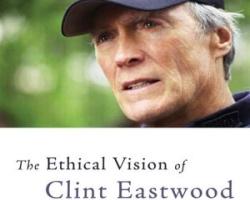Sara Anson Vaux
Eerdmans, 259 pp., $24
You’re probably not alone if you associate Clint Eastwood with guns, Dirty Harry and “Make my day.” In The Ethical Vision of Clint Eastwood, film scholar Sara Anson Vaux wants you to consider “Eastwood’s moral agenda,” which is evident in morally complex films he has directed, including Million Dollar Baby, Mystic River and Invictus.
“On the one hand, Eastwood the actor embodies, perhaps more than any other, the iconic force of the vengeful American killer, machismo at its most remorseless and violent,” she writes. “On the other hand, we have the focus of Eastwood’s cinematic direction on forgotten lives, storytelling marked by eloquence and compassion.”
Vaux, who teaches classes on film and religion at Northwestern University and wrote Finding Meaning at the Movies, seeks to examine “the ways an icon of power honors the least among us with his art.” She carries out her investigation through close readings of Eastwood’s films, looking for motifs of justice, mercy, confession, war and peace, life and death, and reconciliation. She doesn’t find much explicit religious symbolism, but focuses instead on Eastwood’s techniques in a dozen films.
The results are surprising. In his two popular war films, Flags of Our Fathers and Letters from Iwo Jima, both released in 2006, Eastwood examines the horrors of war, first through American soldiers’ eyes and then through the eyes of the Japanese.
In 2008’s Gran Torino, Eastwood plays Walt, a bitter, retired man in Detroit who hates immigrants “and the world in general.” At first, Walt disdains the Asian immigrants who live next door, but in time his position softens. “I have more in common with these gooks than I have with my own spoiled rotten family,” he says. In the conclusion of the film, Walt demonstrates his love for his neighbors by (spolier alert) voluntarily giving his life in “a messianic death pose.”
Eastwood is an award-wining moviemaker who’s at the top of his game. After reading Vaux’s book, you will never look at his films the same way.




